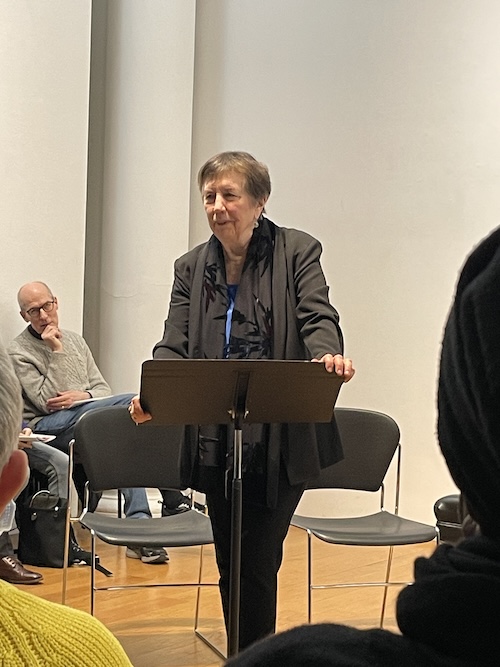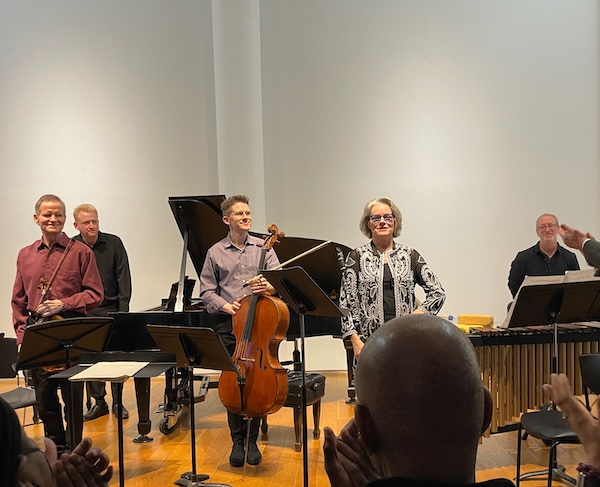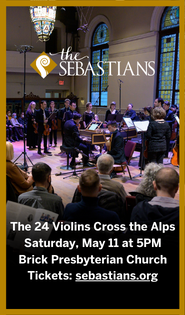At 85, Joan Tower is musically feted by friends and colleagues

There was a time when Joan Tower was something of an exotic figure in classical music—not just a contemporary American composer but a woman.
It was her gender that was the lede on stories about her for decades, followed by minor details such as being appointed composer in residence with the St. Louis Symphony or winning the Grawemeyer Award for her Silver Ladders. But it is the inherent high quality of her music that has made her a prominent composer for decades—up to the present era when contemporary women composers are an integral part of the musical landscape.
Tower’s 85ᵗʰ birthday season was celebrated by the Da Capo Ensemble Sunday night at the Tenri Cultural Institute, where the ensemble played early and recent pieces by Tower, alongside music by two of her colleagues.
Da Capo is a key part of Tower’s career. She was a cofounder of the group in 1969, and in brief remarks to the audience she offered the wisdom that young composers should form their own groups.
That practical approach to music-making came through in the performances, starting with Fanfare for the Uncommon Woman No. 5, for four flutes (Laura Cocks, Andrea Abel, Isabel Lepanto Gleicher, and Jessica Taskov). This is one of six total works in the series that Tower has composed, and was a fine, representative choice for an appetizer. Alternating short, contemplative sections with the kind of resounding and striving qualities of a typical fanfare, the playing was poised and bright.
The trio of violinist Curtis Macomber, cellist Chris Gross, and pianist Steven Beck played Tower’s Big Sky. This was another fine choice to represent her work since the music is biographical, inspired by her memories of riding horses during her childhood in Bolivia. While Big Sky is deeply emotionally expressive, Sunday’s performance was oddly uneven; the intertwining polyphonic lines that spiral upward felt dark and clotted, producing a turgid result rather than coursing forward.
John Boggs is a former student of Tower’s, and he introduced his Descending the Catskills. Boggs sharing how when he came to Bard as a freshman, his teacher Tower steered him away from piano performance to composition. With Cocks and clarinetist Marianne Gythfeldt added to the piano trio, the piece dialed the concert’s energy back up. Though literally made with descending musical patterns, there was a strong rising feeling, a kind of questing and celebration. The program didn’t include Tower’s excellent Petroushskates, but Boggs’ work had its own welcome hints of Stravinsky’s ballet.
The last work before intermission was Tower’s Breakfast Rhythms I and II. She subtly disavowed the piece in her remarks, pointing out it came from when she was an “uptown” composer, out of Columbia. Dating from 1974, the music hails from a time before Tower found her own voice. The atonality still feels effortful and anonymous. With Michael Lipsey added on percussion and James Baker conducting, Gythfeldt handled the awkward clarinet lead with concentration. Some of the rhythmic vitality of Tower’s later work came through in stabbing chords on the piano, but it seemed an odd choice for this concert.
There were two short works for Tower’s Bard colleague Erica Lindsay to open the second half. Lindsay teaches jazz composition and improvisation at the college, and the pieces, slowly, letting go and Transmutation Variations, emphasized horizontal, through-composed lines with the feeling of instrumentalists working through phrases to some idea of form.
That came together structurally in the first piece, although the ensemble wasn’t consistently assured in the rhythmic inflections, less so in the second, which was based around a seemingly improvised central solo from a guest bassist, the great jazz player Mark Helias. Like the Breakfast Rhythms, the music didn’t clearly define what makes the composer the artist she is.
The finale was Tower’s Into the Night. The 2022 piece comes from her wrenching personal experience of the last years of her husband’s life, when she wondered if he would survive each night. It’s a terrific piece, a model of both compositional craft and purpose, the how and why of making music. A sequel to Breakfast Rhythms in that it shares the same instrumentation, this was Tower at her best, and Da Capo gave it a focussed and confident performance.
The music began with the deep satisfactions of harmony, a series of expertly sequenced chords that were full of evocative intervals, surprises, and emotional resonance. As the rhythms came in, one heard the essence of composition, how small musical structures logically lead to a sense of expressive form, and how hearing all these elements come together creates palpable energy. There was great drama as the music moved from a robust muscularity to the feeling of sunlight breaking through, and a massive head of steam rose, at the end, into perfectly judged, gentle harmonies. A real masterpiece.
Da Capo Chamber Players presents “Middle East Influences,” 8 p.m. May 19. dacapochamberplayers.org








